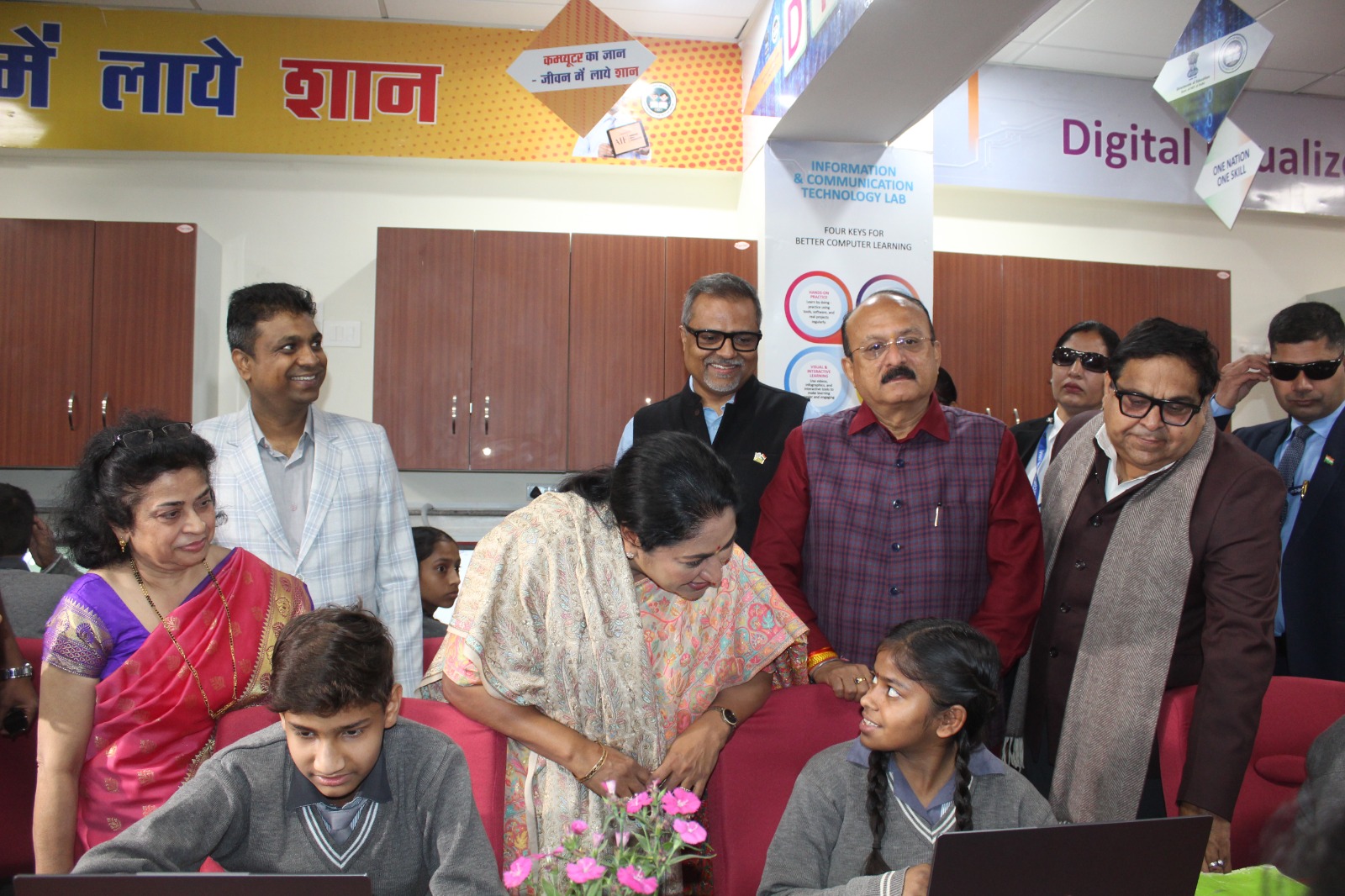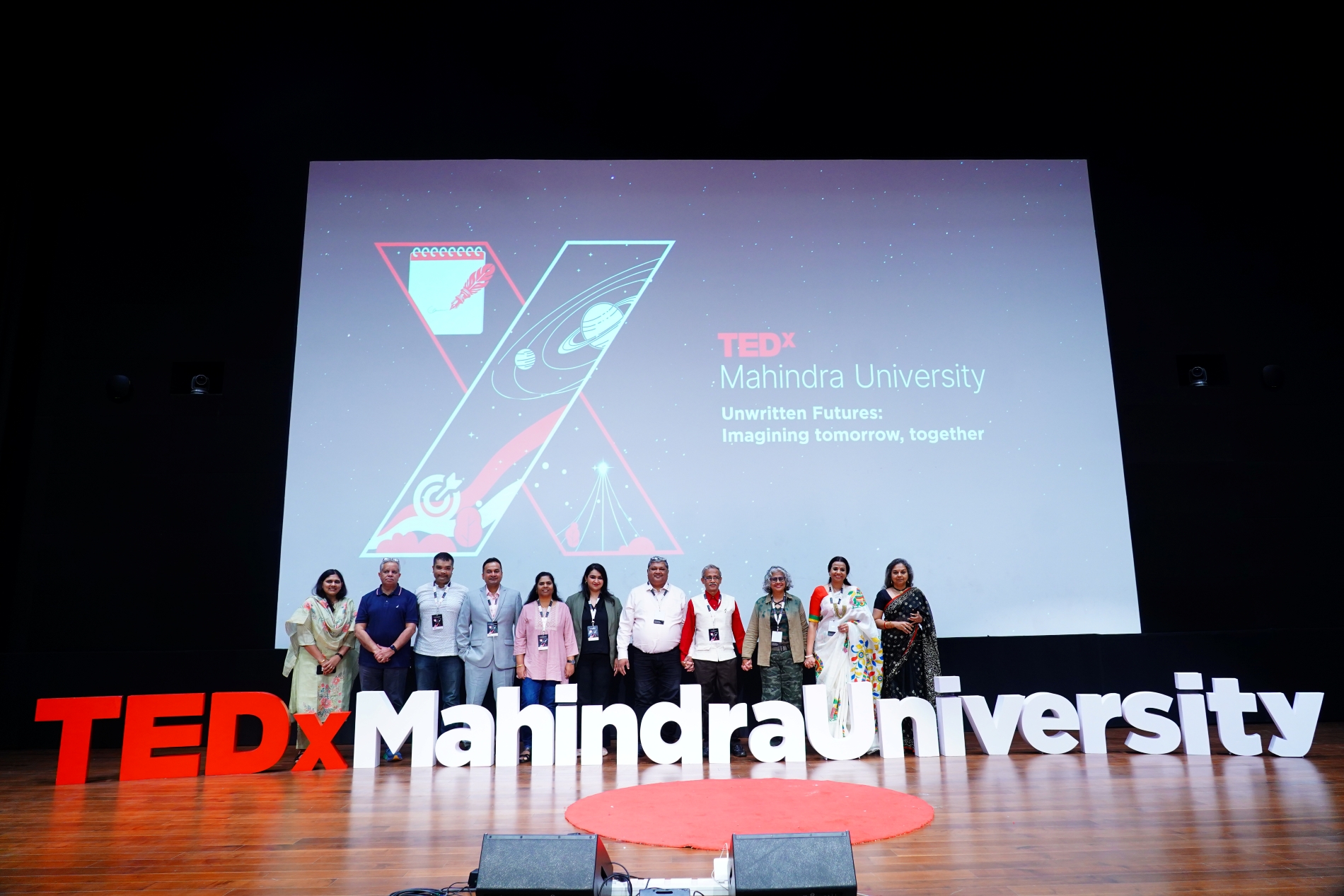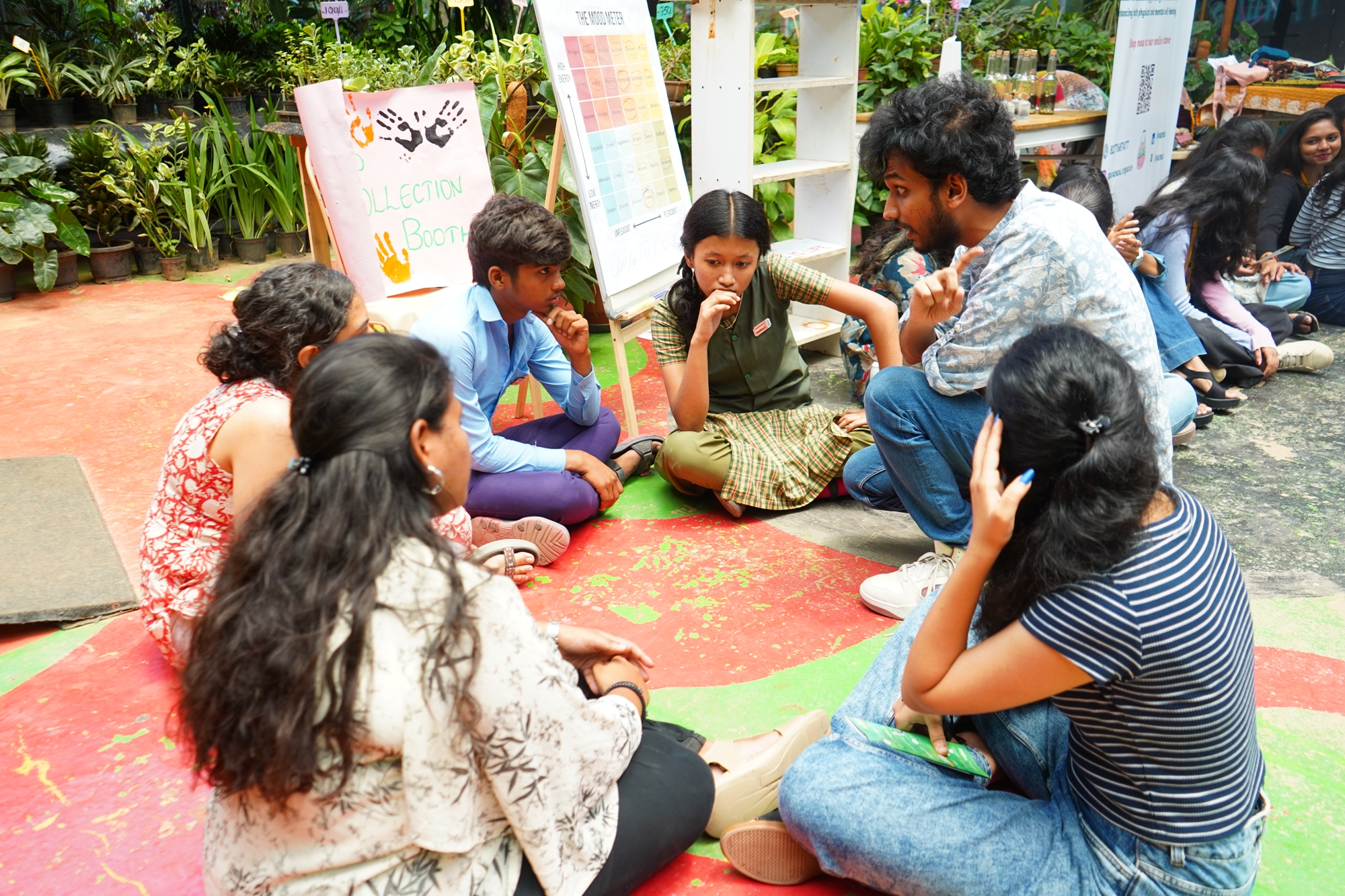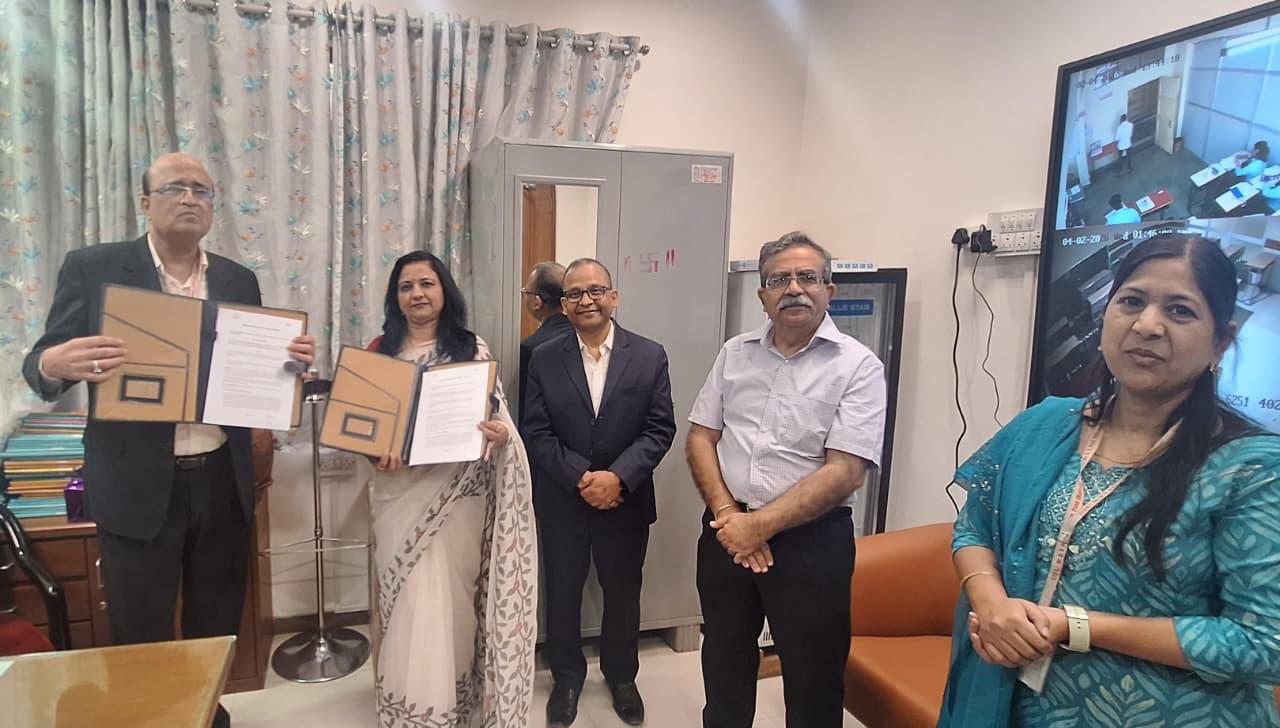16, Feb 2026
IIM Bodh Gaya Hosts International Research Conference on Mindfulness, Advancing Global Dialogue on Mindfulness in Research and Leadership
Bodh Gaya, Feb 16: The Indian Institute of Management Bodh Gaya inaugurated the International Research Conference on Mindfulness (IRCM) 2026, the third edition of its flagship biennial conference dedicated to advancing interdisciplinary research on mindfulness. Held over two days in a hybrid format, the conference brought together academicians, researchers, practitioners, and students from across India and abroad, including participants from Japan, Vietnam, and New Zealand.
The conference witnessed a global response, receiving over 255 paper submissions, reflecting a more than threefold increase from its previous edition. The strong participation underscores the growing relevance of mindfulness-based research across management, social sciences, and allied disciplines.
The event was inaugurated by Dr. Vinita S. Sahay, Director, IIM Bodh Gaya, in the presence of conference conveners Dr. Remya Lathabhavan and Dr. Teena Bharti. Distinguished speakers, including Dr. Jyoti Bachani, Saint Mary’s College of California, Dr. Vishal Gupta, IIM Ahmedabad, and Dr. Ramya Tarakad Venkateswaran, IIM Calcutta, delivered keynote addresses emphasising the integration of contemplative practices with modern research to enhance organisational effectiveness and societal well-being.
In her address, Dr. Vinita S. Sahay underscored the enduring value of contemplative traditions, noting that the “acid test of the greater good is the test of time,” and describing mindfulness as a time-tested philosophy that continues to guide meaningful ways of living and leading. Dr. Jyoti Bachani stated, “Wisdom is eternal, while AI is ephemeral,” and highlighted the importance of convening such dialogue in Bodh Gaya, the land historically associated with the origins of mindfulness.
Organised around 12 thematic tracks, the conference explored mindfulness in leadership, organisational behaviour, finance, education, decision-making, and sustainability. Scholars presented empirical and conceptual work that examined how reflective awareness can bridge research gaps and generate solution-oriented outcomes across disciplines.
Pre-conference workshops featured applied learning sessions. Mr. Shishir Arya, an IIT, IIM alumnus-turned mindfulness coach, conducted experiential sessions linking professional effectiveness with mindful living. Dr. Surbhi Dayal, faculty at IIM Indore and an expert in Madhubani art, facilitated an interdisciplinary dialogue connecting mindfulness, artistic expression, and lifestyle transformation. These workshops encouraged participants to align theoretical frameworks with lived emotional and cognitive experiences.
The conference concluded with addresses by Dr. Oleg Medvedev, University of Waikato, New Zealand, Dr. Prachi Thakur, JAGSoM, India & Sunway University, Malaysia, and Dr. Yanki Hartijasti, Universitas Indonesia, who highlighted emerging global research collaborations and the role of mindfulness in shaping resilient institutions and societies. The valedictory session included an expression of gratitude to contributors, participants, and the organising committee for fostering a vibrant platform for dialogue and discovery.
As the world accelerates in complexity, IRCM 2026 reaffirmed the importance of reflection, clarity, and conscious engagement. Mindfulness remains a core value of IIM Bodh Gaya, and the institute is committed to embedding it across teaching, research, and leadership development to nurture responsible, self-aware, and socially conscious leaders.
- 0
- By Neel Achary
11, Feb 2026
IIT Delhi opens admissions for its Online PG Diploma in Healthcare Product Development and Management
Feb 11: The Indian Institute of Technology Delhi (IIT Delhi) has announced admissions for the second batch of its Online Postgraduate Diploma in Healthcare Product Development and Management. Offered by the Centre for Biomedical Engineering, IIT Delhi, the programme delivers a multidisciplinary learning experience spanning biomedical innovation, regulatory science, commercialisation strategy and product management. Through a carefully designed curriculum, it enables learners to build the capabilities required to translate healthcare solutions into market-ready products.

The 12-month Online Postgraduate Diploma in Healthcare Product Development and Management suits professionals and aspiring specialists across the healthcare product ecosystem, whether they work in biotechnology research, healthcare entrepreneurship, medical technology or regulatory functions. The programme builds role-ready competencies for careers in biotech, medical devices, pharmaceuticals, healthcare IT and digital health innovation. It also strengthens foundational understanding of human anatomy and disease pathways to inform product conceptualisation, develops practical knowledge of materials and mechatronics for healthcare applications and sharpens the ability to evaluate emerging research directions and innovation opportunities in healthcare product development.
India’s healthcare sector continues to expand rapidly, driven by population density, access gaps and an accelerating push towards technology-led delivery. Estimates indicate India requires 2.4 million additional hospital beds, translating into approximately 2 billion square feet of healthcare infrastructure to move towards global standards. Brickwork Ratings has projected that India’s hospital sector could reach USD 202.5 billion by 2030, from an estimated USD 122.30 billion in 2025, supported by rising demand, private investment, government initiatives and the adoption of technologies such as AI and telemedicine. AI’s share of the healthcare market is projected to exceed 30% by 2030, up from approximately 15% currently. In parallel, the wearable medical devices market is projected to grow to USD 184.75 billion by 2033, from USD 42.1 billion in 2024, propelled by consumer adoption, healthcare digitalisation, and intelligent monitoring technologies.
Speaking on the announcement of the second batch Prof. Arnab Chanda, Programme Coordinator, IIT Delhi said,
“India’s healthcare growth demands professionals who can build products with scientific depth and real-world viability. This diploma trains learners to move from unmet clinical needs to validate, compliant and commercially scalable solutions. We bring together engineering, clinical perspective and product strategy through rigorous coursework, practical projects and expert-led teaching, so participants can deliver innovations that stand up to regulatory and market expectations.”
Graduates, postgraduates and working professionals with BE/BTech/BCA/BIT in any engineering discipline or equivalent, BSc (or equivalent) in life sciences and related basic sciences, and MBBS, BDS, BPharm or allied disciplines can apply. The programme also considers professionals from healthcare, biomedical, biotech or related industries with BE/BTech/BSc/Diploma in Engineering/MBA/MCA qualifications. Participants can pursue roles such as Healthcare Product Manager, Medical Technology Consultant, Regulatory Affairs Specialist, Health Data Analyst, among others.
The year-long programme includes 450+ hours of learning, comprising 200 hours of live online sessions, 120 hours of practical work and projects and a two-day campus immersion. The curriculum spans 18 academic credits across two semesters and includes eight modules, covering topics such as Mechanics of Biomaterials, Biofabrication, Research Techniques in Biomedical Engineering, Soft Tissue Characterisation and Applications, Healthcare Wearables Design and Applications, and Healthcare Entrepreneurship and Management, among others. Learners also work with tools such as Pick 3D Printer, AutoCAD, and UX/UI platforms.
Delivered by IIT Delhi faculty and industry experts, including eminent healthcare industry experts, the programme runs through live, interactive online classes and combines academic rigour with practical application. Participants engage in real-time simulations, case-based analyses and hands-on projects, with an optional two-day campus immersion designed to deepen peer learning and professional exchange. On successful completion, learners receive Affiliate Alumni Status.
10, Feb 2026
Delhi CM Inaugurates 100 Advanced ICT Labs in Government Schools to Boost Digital Learning
New Delhi, Feb 10: In a significant step toward strengthening digital education in government schools, Chief Minister of Delhi, Smt. Rekha Gupta, inaugurated 100 advanced ICT labs across Delhi government schools today. The labs were set up under the Digital Equalizer Program by the American India Foundation (AIF) in partnership with Ladli Foundation Trust. The inauguration took place at Sarvodaya Vidyalaya, Mansarovar Garden.

The ceremony was attended by Education Minister Shri Ashish Sood, Director of Education Ms. Veditha Reddy, AIF CEO Mr. Nishant Pandey, Ladli Foundation Founder Devendra Kr. Gupta, along with senior education officials, school principals, teachers, and students.
Each of the 100 schools has been equipped with a state-of-the-art ICT lab, featuring 20 computers and one Interactive Flat Panel Display (IFPD). To ensure effective usage, a trained resource person will be available in each school to assist teachers and students in digital learning.
Key Highlights of the Initiative:
-
100 advanced ICT labs across Delhi government schools
-
20 computers and 1 IFPD per school
-
Dedicated on-ground resource person support
-
Focus on digital inclusion and practical hands-on learning
CM Smt. Rekha Gupta said,
“Before completing one year of our government, we have delivered a century of computer labs for Delhi’s marginalised students. We thank the American India Foundation and Ladli Foundation for partnering with us in this important mission.”
Education Minister Shri Ashish Sood added,
“This initiative strengthens digital education and equips students with essential computer skills for higher education and future careers.”
Mr. Nishant Pandey, CEO of AIF, commented,
“Through the Digital Equalizer Program, we aim to reduce learning inequities by expanding access to technology and building digital confidence among students. These labs will open new learning and career pathways for thousands of young learners.”
Mr. Devendra Kumar, Founder of Ladli Foundation, said,
“This initiative bridges the digital divide for marginalised students, ensuring they can compete equally in a rapidly digitising world.”
The launch marks a major milestone in promoting digital inclusion and practical learning, enabling government school students to gain hands-on experience with technology and preparing them for the demands of the 21st century.
10, Feb 2026
From ideas to authorship: TEDxMahindraUniversity 2026 explores ‘unwritten futures’
Hyderabad/ New Delhi, Feb 10: TEDxMahindraUniversity successfully concluded its latest edition, bringing together students for a day of ideas, reflection and collective imagination. Designed as a platform to share and engage with original thinking emerging from their own community, the event reinforced the role of young voices in shaping the future.

This edition unveiled the theme for 2026, ‘Unwritten Futures: Imagining tomorrow, together’, positioning the future not as a predetermined outcome, but as a blank page open to authorship. The theme challenged students, speakers and the audience to move beyond passive observation and step into active participation, emphasising that meaningful change begins with the courage to imagine beyond existing systems and constraints.
Dr Yajulu Medury, Vice Chancellor, Mahindra University, emphasized,
“The theme of this year reflects our belief that education is not just about understanding the world as it is, but about equipping our students to define what comes next. At Mahindra University, we strive to inspire young thinkers to imagine boldly, act with purpose and build futures that are inclusive, compassionate and impactful.”
Through a series of talks and conversations, speakers explored how true transformation requires more than incremental progress. The ideas presented encouraged a fundamental rethinking of how success is defined, shifting the lens from competition and output towards contribution, compassion and long-term impact. Central to this dialogue was the dismantling of outdated paradigms and the emergence of new frameworks for living, learning and leading in a rapidly evolving world.
The event featured a lineup of inspiring speakers, including Mr. Aaboo Varghese, Founder and Executive Director, Purnata, Dr Bhulakshmi V, Founder, GapSkills Learning Solutions Pvt. Ltd., Dr G Madhavi Latha, Professor, IISc and Chair of Centre for Sustainable Technologies, Dr Sarita Subramaniam, Director and Co-found Earth Brigade Foundation (NGO), Sqn Ldr. Neeraj Sharma (retd.), Cybersecurity Leader, Mr Shrinivas, C S Educator, EduVision TLS, Ms. Sharanbir Kaur, Client Partner – Financial Services, Real Estate and Travel, Meta and Mr. Vivek Sundaram, Technologist Exploring Purpose Presence and Human Potential.
A recurring insight across sessions was that outward innovation must be anchored in inner alignment. Speakers underscored the importance of personal rewriting, recognising that shaping an unwritten future requires internal transformation as much as external action. Discussions highlighted the need for holistic growth that integrates emotional resilience, intellectual courage and purposeful intent, while building the emotional infrastructure necessary to navigate continuous change.
The event examined how collaboration, empathy and cooperation must become foundational principles as societies adapt to shifting global realities. Speakers challenged inherited norms around interaction and resource-sharing, offering perspectives on how shared authorship of the future can lead to models of progress that unite rather than divide.
10, Feb 2026
Outcome-Driven Upskilling Platforms Shaping Future-Ready Careers in 2026
As industries continue to evolve at breakneck speed, traditional degrees alone are no longer enough to stay relevant. In 2026, learners and professionals are increasingly turning to outcome-driven upskilling platforms that offer real-world exposure, mentorship, and career acceleration rather than just certificates.
Here are some of the top upskilling platforms to watch in 2026, based on their focus on employability, learner outcomes, and alignment with future-ready skills.
1. NextLeap:
For young professionals who want to break into tech jobs, NextLeap is a strong job accelerator that helps users find successful paths into high-demand technology-specific positions such as Product Management, UI/UX Design, Data Analytics, Business Analytics, and Software Engineering. NextLeap’s unique fellowship-based approach uses a combination of live training sessions, hands-on projects, peer-based learning, and interview preparation. Unlike traditional passive learning styles, NextLeap’s approach focuses on real-world case studies, solving problems and helping develop skills through structured mentorship. Due to a rapidly increasing audience of users, and recognition as one the most exciting EdTech startups in South Asia, NextLeap is well-positioned to become a primary resource for young professionals who want to obtain practical job-focused skills in 2026.
2. Coursera
Ideal for students looking for a structured program from one of the top global universities and corporations. Coursera provides access to both sub-programs and complete degree programs in many fields, including artificial intelligence, data science, cloud computing, business, and cybersecurity. Coursera combines the academic quality of college courses with industry-relevant material as of 2026, making COURSES from accredited institutions of higher learning (and professional certifications) appealing to many learners.
3. upGrad
Ideal for working professionals who want formal recognition for their skill development. Build on its success as a key player in the upskilling sector in India by partnering with colleges to create long-term programs. upGrad focuses on four major themes: management, technology, data science and digital marketing. Professionals who wish to leave their current jobs to pursue structured professional development while continuing to earn an income are drawn to upGrad’s robust support of students through career services, alumni network connections and partnerships with their industry, making it a very popular choice for professionals.
4. Scaler
Best for people looking to improve their skills in Software Engineering and Coding If you’re looking for a way to become a better developer, Scaler (originally known as CareerMonk) can help improve your DSA, System Design and Software Engineering skill sets. Their extensive curriculum allows you to take live classes, receive mentorship and prepare for the top technology jobs available today. With the exponential growth of highly-skilled engineering professionals in 2026, expect Scaler to remain a significant player in developing talent and helping to build India’s developer workforce.
5. Udacity
Best for those seeking cutting edge technology skills and nano-degrees, the Nano-Degree Courses at Udacity are created for emerging technology areas, such as Artificial Intelligence, Machine Learning, Autonomous Systems and Cloud Computing. Many of these courses were created in collaboration with leading Technology Companies, and are structured as Project-based courses. Expect Udacity to continue as a great option for learners who want to gain a high degree of specialization in emerging technology areas after 2026.
6. Simplilearn
Top choice: Professional certifications and enterprise education. Among the various certification training provider options available today, most people recognize Simplilearn for their entire suite of certification courses in cloud computing, DevOps, information security, project management and digital marketing. They also have an impressive enterprise education platform providing solutions for individual learners as well as corporate teams. With its many industry-aligned certifications Simplilearn maintains its relevance amongst up-and-coming professionals looking to rapidly gain additional skill sets.
The Road Ahead
The trend towards practical-based learning; through industry alignment; by having measurable learning outcomes; and finally having a greater emphasis placed on mentorship; hands-on or real-life applications; and how ready students are for careers rather than simple learning will drive the next phase for upskilling. In 2026 whoever(s) is/are expected to lead will likely be doing so from platforms like NextLeap, which connects the dots between learning and being employable in the eyes of the employer; thus, these types of businesses will help define the next generation of professionals.
10, Feb 2026
SolveCon ’26 to Power India’s Next Generation of Youth Changemakers
Bengaluru, Feb 09 : Reap Benefit, a leading nonprofit building India’s largest movement of youth changemakers known as Solve Ninjas, will host the 10th edition of SolveCon on 21 February 2026 at PES University, Bengaluru. The national gathering will bring together over 1,500 young people and 80+ organisations, including Rohini Nilekani Philanthropies (RNP), Azim Premji University, and Teach For India, alongside practitioners from across sectors for a one-day, youth-led festival of action and learning. SolveCon 2026 will feature interactive spaces and creative experiences focused on civic action, climate, mental health, science, art, and community-led problem-solving. The event will also host renowned speakers such as Kailash Nadh, CTO, Zerodha, and Board Member, Rainmatter Foundation; Rohini Nilekani, Chairperson, RNP; Ashwini Hiremath, Founder, Wild Wild Women; and Deepak Dhananjaya, Organisation Coach, Psychotherapist, and Founder, Prabhava Institute of Inclusive Mental Health (PIIMH).

SolveCon ’26 marks the first national edition of SolveCon—an initiative that has grown over the past 18 months through nine editions across multiple cities. Built around three simple ideas—Connect, Learn, and Lead—the event is designed to help young people meet like-minded peers, try hands-on learning and real-world problem solving, and explore ways to step into leadership and action in their own communities. This edition also celebrates the shared journey of Reap Benefit and thousands of Solve Ninjas over the years, recognising young people who have consistently driven change in their cities and neighbourhoods.
Across nine previous editions, SolveCon has engaged close to 1,700 youth from Tier 1, 2, and 3 cities, hosted over 40 short, hands-on learning sessions, and enabled more than 40 young changemakers to publicly share their journeys in civic and climate action. Around 20 organisations—including funders, educators, and civic groups—have participated not as observers but as collaborators, creating interactive spaces, mentoring young participants, and sharing practical tools and experiences.
Speaking on the upcoming edition, Kuldeep Dantewadia, Co-Founder and CEO of Reap Benefit, said,
“SolveCon was born from what we were witnessing on the ground through Reap Benefit’s Solve Ninja programme. When young people are trusted to act, they deliver real outcomes—over 1.5 lakh youth have taken more than 1 lakh civic actions, initiated thousands of local campaigns, and built hundreds of community solutions across India. As this work grew, we realised that reports couldn’t fully capture what youth-led changemaking actually feels like. SolveCon was created to make that lived experience visible—bringing young people and the ecosystem together to learn by doing, act collectively, and see what becomes possible when the right conditions are created for youth leadership.”
For many participants, SolveCon becomes a starting point for continued civic and climate action helping them find peer networks, mentors, and pathways such as Reap Benefit’s Solve Ninja programme.
SolveCon ’26 will bring these experiences together through three core spaces:
- A Mela with interactive stalls and installations hosted by partner organisations and Solve Ninjas
- Short, hands-on learning sessions across themes such as civic action, climate, mental health, art, and science
- Addas, or small reflection circles focused on sharing lived experiences and peer learning
The event will close with a leadership forum and a collective cultural programme celebrating youth voices and creativity.
9, Feb 2026
20,000+ runners participated in the 8th Edition of Manipal Marathon, organized by Manipal Academy of Higher Education
Manipal, Feb 09: The 8th edition of the Manipal Marathon concluded successfully at KMC Greens, Manipal, on 8th February 2026, organized by Manipal Academy of Higher Education (MAHE), an Institution of Eminence and Deemed to be University. Recognized as one of India’s largest student-led community fitness events, the marathon drew over 20,000 participants, including 100+ international athletes, competing across categories for a prize pool exceeding ₹25 lakhs.

Themed “Miles for a Greener Tomorrow Run for a Sustainable Future”, this edition reinforced MAHE’s commitment to environmental stewardship. The event aligned with ongoing sustainability initiatives, including tree plantation, biodiversity conservation, solar energy utilization, waste management, rainwater harvesting, and sustainable mobility, extending its impact beyond campus into the broader community.
Addressing the enthusiastic crowd, Dr H S Ballal, Pro Chancellor, MAHE, remarked,
“The overwhelming response to the 8th edition of the Manipal Marathon demonstrates MAHE’s vision of fostering holistic development beyond academics. By bringing together over 20,000 runners, we are promoting fitness, wellness, environmental stewardship, and community engagement. What began as a student initiative has grown into one of India’s largest community fitness events, attracting participation from over 10 countries.”
Over 100 international athletes participated, representing countries such as Dubai, England, Ethiopia, Germany, Kenya, Japan, Malaysia, Nepal, Sri Lanka, and the USA, strengthening the marathon’s global profile. The scenic beachside route for the 42K runners provided a memorable experience, while the newly introduced 10K route, including the Manipal Hospice Respite Centre (MHRC), emphasized the marathon’s enduring focus on social impact.
The event was graced by dignitaries, including Lt. Gen. (Dr.) M D Venkatesh, VSM (Retd.), Vice Chancellor, along with Dr Sharath Rao, Pro Vice Chancellor (Health Sciences), Dr. Dilip G. Naik, Pro Vice Chancellor (Mangalore Campus), Dr Anand Venugopal, COO Operations, Dr Gopalakrishna Prabhu, Vice Chancellor, Sikkim Manipal University, and other MAHE officials.
In line with MAHE’s focus on equity and inclusivity, the marathon featured dedicated categories for differently-abled and visually challenged runners, with age-wise classification, receiving enthusiastic participation.
MAHE expressed its gratitude to the title sponsors including ICICI Bank, UNEXT, Deloitte, BOBCARD, and all partners whose support contributed to the success of Manipal Marathon 2026.
The names of winners across various categories are:
42K Fastest Male
1 Sathish Kumar
2 Sachin Poojari
3 Desye Endalew
42 Fastest Female
1 Senait Kefelegn Lesharge
2 Yenealem Ayano Buli
3 Neeti Kriplani
21K Fastest Male
1 Rijwan Ali
2 Shashwath Rajesh Poojary
3 Nalinakshan Kizhakkedath
21K Fastest Female
1 Bhawana Negi
2 Nandini G
3 Rutuja Patil
10K Fastest Male
1 Shivanand Chigari
2 Shreedhara SN
3 Mubarak R Dantali
10K Fastest Female
1 Shahin S Dharwad
2 Shreya Moodekallu
3 Chaithra TP
5K Fastest Male
1 Nagaraj Divate
2 Ranga
3 Manjunath Belurappanavar
5K Fastest Female
1 Nagini Nagini
2 HV Deeksha
3 Rekha B.P. Basappa Piroji
The event concluded with a vibrant post-run carnival by fitness enthusiasts and students, featuring music and interactive fitness and Zumba sessions to celebrate the Manipal Marathon.
9, Feb 2026
DPU School of Allied Health Sciences Partners with AREF to Boost Healthcare Skill Development
DPU School of Allied Health Sciences and AREF Announce Strategic Collaboration to Strengthen Healthcare Skill Development and Community Health Research
Feb 09: D.Y Patil University, School of Allied Health Sciences and Adiuvaret Research & Education Foundation (AREF) today announced a strategic collaboration aimed at advancing holistic healthcare education, enhancing skill-building capabilities, and fostering community-focused health initiatives across the allied health and healthcare management education sectors.

This partnership brings together the academic excellence of DPU School of Allied Health Sciences with AREF’s proven expertise in healthcare management learning, curriculum development, and educational support systems. The collaboration will focus on developing structured skill ecosystems in public health and biomedical research, interdisciplinary learning modules for community health, and research-driven models that address the evolving needs of students, educators, and communities.
Dr. Abhay Saraf, Director, DPU School of Allied Health Sciences, said,
“With AREF’s proven capabilities and our shared vision for holistic development, this partnership marks the beginning of a transformative journey that will reshape how students learn, engage, and contribute to society. Together, we aim to build future-ready skill ecosystems, encourage impactful research, and strengthen our community outreach initiatives. By uniting academic excellence with real-world application, I believe this collaboration will set new benchmarks in skill-building, interdisciplinary innovation, and sustainable community impact.”
Highlighting the significance of the partnership, Dr. Biranchi Jena, Director, AREF, said,
“Collaborating with DPU School of Allied Health Sciences is a tremendous opportunity to integrate our practical experience in health management education with a leading academic institution. Our shared commitment to quality, accessibility, and innovation positions us to create meaningful change. We look forward to co-creating programs, resources, and learning pathways that elevate student readiness and deliver long-term value to the communities we serve.”
The partnership will further explore joint programs, research initiatives, field training, community engagement activities, and development of educational tools and materials. Both institutions aim to position the collaboration as a model for future academic-industry partnerships in India.
9, Feb 2026
PhysicsWallah Offers Free Doubt Support and Mock Preboards for Class 10 CBSE Students
PhysicsWallah Announces Free Doubt Resolution Support and Mock Preboards for Class 10 CBSE Students across India
Bengaluru, Feb 09: Education company PhysicsWallah (PW) announced a student support initiative aimed at assisting aspirants appearing for the Class 10 CBSE Board Exams in 2026. Students across the country can avail free doubt resolution and expert guidance. This initiative is not only open for PW students but any Class 10 student across the country. The initiative is designed to help reduce academic pressure during the exam season.
PW will also facilitate offline preboards in Science and Mathematics nationwide in an attempt to strengthen student readiness. These examinations will be conducted at PW’s physical centres like Vidyapeeth, Pathshala, and Tuition Centres to simulate real board exam conditions and help students improve proficiency and time-management skills under exam-day constraints.
Ankit Gupta, CEO of Vidyapeeth-Offline of PhysicsWallah (PW), said,
“Education should never be restricted by boundaries, especially when a student is preparing for a defining moment like the Board Exams. Many students lack immediate access to quality exam support and we know even a single unresolved doubt can cause stress. By opening our Vidyapeeth, Pathshala and Tuition centres to every student, regardless of whether they are enrolled with us or not, we are simply doing what is right for the student community. We want aspirants to feel supported, confident, and ready to perform to their full potential.”
Students across India can visit their nearest PW Vidyapeeth, Pathshala or Tuition Centre to obtain a Doubt Buster Pass, valid till the board exams, and book a slot for doubt resolution. Experienced faculty members will address specific queries, explain complex topics, and offer strategic guidance on answer-writing techniques. Students can clarify doubts across subjects including Physics, Chemistry, Mathematics and Biology, and also receive revision cards for the CBSE Class 10 syllabus to support their preparation.
Students can book a slot at their nearest centre for the Science exam scheduled on 1 February 2026 and the Mathematics exam scheduled on 8 February 2026 through the PW app.
The initiative is being rolled out through PhysicsWallah’s network of 192 tech-enabled Vidyapeeth and Pathshala centres located across 132 cities in India as of 30th September 2025.
6, Feb 2026
Amity University Hosts ICESBD’26 on Sustainable Entrepreneurship and Gig Innovation
New Delhi, Feb 6: Amity School of Business (ASB), Amity University Uttar Pradesh, successfully hosted the 4th Edition of the International Conference on Entrepreneurship and Sustainable Business Development (ICESBD’26). The conference centered on the theme: “Evolving Enterprises: Navigating GIG Innovation, Green Operations and Digital Relationship”, bringing together researchers, students, entrepreneurs, and policymakers to discuss innovative and sustainable business practices.
Conference Highlights:
-
Keynote Addresses:
-
Ms. Simin Askari, Chief Human Resource Officer, DS Group, emphasized the importance of sustainability, gig economy recognition, and digital transformation in today’s evolving business landscape.
-
Ms. Saranya Pradhan, Head – Sustainability and Corporate Communication, McCain Foods, highlighted how sustainable practices, gig innovation, and digital relationships drive growth, customer loyalty, and long-term value creation.
-
Mr. Santosh Sharma, Founder & CEO, Book My Jet, underlined how eco-friendly operations and leveraging global freelance talent foster innovation, cost efficiency, and enhanced customer engagement.
-
Prof. (Dr.) Balvinder Shukla, Vice Chancellor, AUUP, stressed the synergy between entrepreneurship and sustainability as a key driver for economic growth while minimizing environmental impact.
-
-
Panel Discussions & Workshops:
-
Panel discussion on “Sustainable Innovation in the Gig Economy: Trends, Opportunities, and Challenges”.
-
Paper presentations covering topics such as gig economy entrepreneurship, circular business models, digital relationship management, and resilience in entrepreneurial ecosystems.
-
Research paper development workshop on crafting high-quality submissions for Scopus-indexed journals.
-
-
NEXT GEN – INNOVATE EXPO 2026:
-
The conference featured an exhibition of 29 start-ups and businesses founded by young entrepreneurs, showcasing sustainable, digital, and disruptive innovations.
-
Dr. Sujata Khandai, Director – ASB, said,
“Entrepreneurs are increasingly integrating eco-friendly products, renewable energy, and ethical supply chains into their business models. ICESBD’26 provides a platform for thought leaders and innovators to share insights, inspire students, and explore transformative strategies for sustainable entrepreneurship.”
ICESBD’26 reinforced Amity University’s commitment to nurturing future-ready entrepreneurs, emphasizing sustainability, innovation, and digital transformation as cornerstones for the next generation of business leaders.







